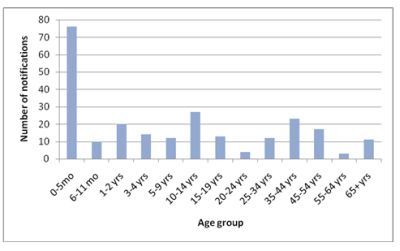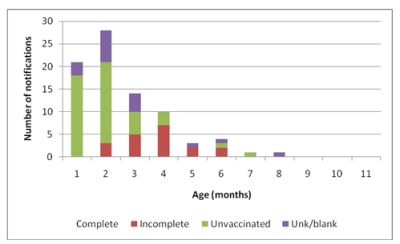Continued increase in Pertussis (Whooping cough)- update July 2012
Pertussis (also known as whooping cough) is of growing concern in Ireland, an increase in cases seen in 2011 has continued in 2012.
Pertussis, also known as whooping cough, is a highly contagious respiratory disease. The disease is known for uncontrollable, violent coughing which can make it difficult to breathe. After a bout of coughing, someone with pertussis often needs to take in a deep breath which results in a "whooping" sound. Pertussis most commonly affects infants and young children and can be fatal, especially in babies less than 1 year of age.
Up to 15th July, 244 cases of whooping cough have been reported to the HSE, of which 138 (57%) are laboratory confirmed. This is three times the number reported for the same time period last year. The age group most affected are young infants aged less than 6 months (76 cases), with almost two thirds of these cases being under 3 months. Many were either unvaccinated or incompletely vaccinated. Some were too young for vaccination (< two months of age). (Figures 1 and 2)
In all, 71 people have been hospitalised, and three quarters of these were aged less than 6 months.
Recommendations
Vaccination offers the best protection for young children. Parents please ensure that your child is vaccinated promptly with the pertussis containing vaccine (‘6-in-1’ vaccine) at 2, 4, and 6 months of age. A fourth dose is recommended at 4-5 years, at school entry. A further booster, using Tdap which contains low dose acellular pertussis vaccine, was introduced to the schools immunisation programme in the 2011/2012 academic year on a phased basis for first year students in second level schools and it is planned to extend this to all areas from next September. Children who have never received pertussis vaccines should attend their GP for vaccination.
People who think they or their child may have pertussis should contact their GP for appropriate treatment and stay away from young children and infants until properly treated. Treatment of people who are close contacts of pertussis cases is also an important part of prevention.
Please see your GP if you think you or your child may have pertussis. Pertussis is a notifiable disease.
What does pertussis sound like? You can hear the cough by clicking here and following the link.
For more information on pertussis please click here.
Figure 1. Pertussis notifications, by age group, week 1-28 2012

Source: CIDR data extracted 16/07/2012 (provisional)
Figure 2. Pertussis notifications, by vaccination status, infants (aged 0-11 months), week 1-28 2012 (n= 86)

Source: CIDR data extracted 16/07/2012 (provisional)


